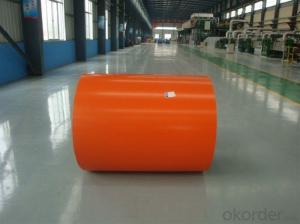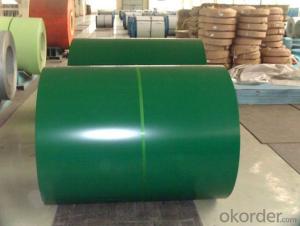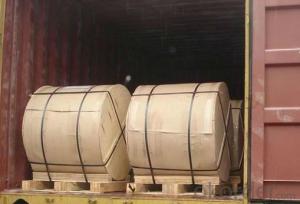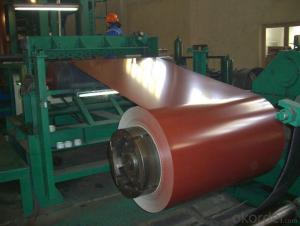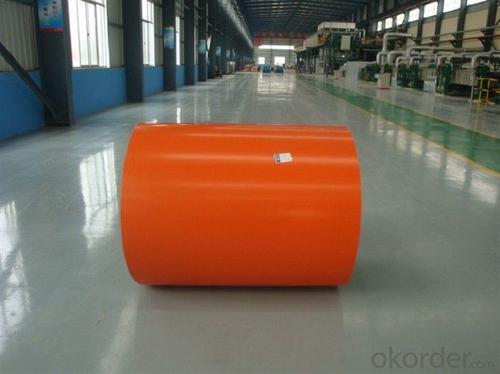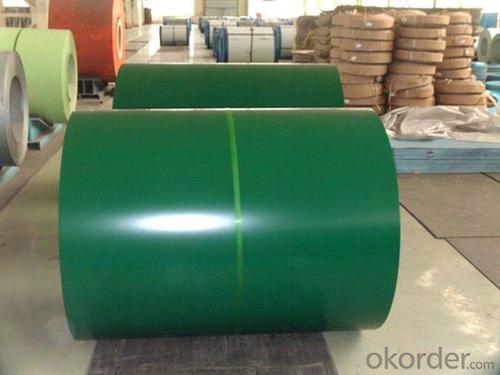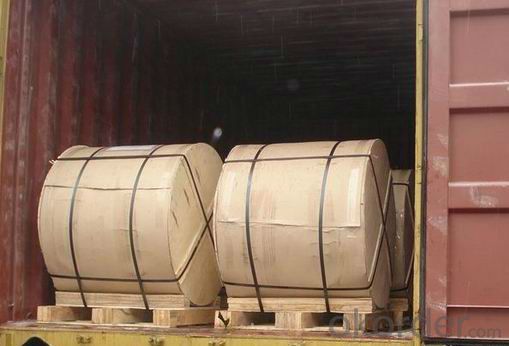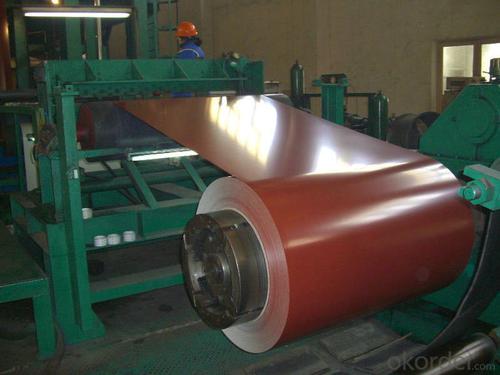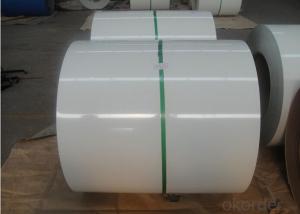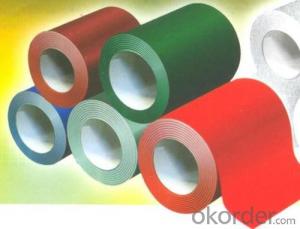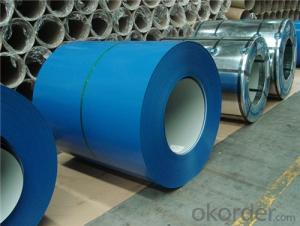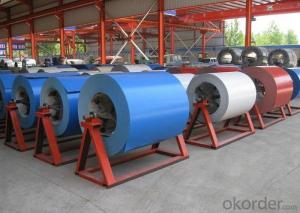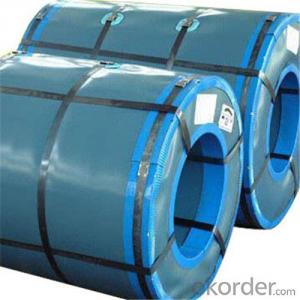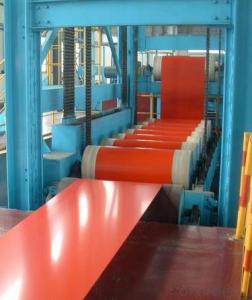Prepainted Rolled steel Coil for Construction Roofing constrution
- Loading Port:
- Shanghai
- Payment Terms:
- TT OR LC
- Min Order Qty:
- 50 m.t.
- Supply Capability:
- 30000 m.t./month
OKorder Service Pledge
OKorder Financial Service
You Might Also Like
Structure of Prepainted Rolled steel Coil for Construction Roofing
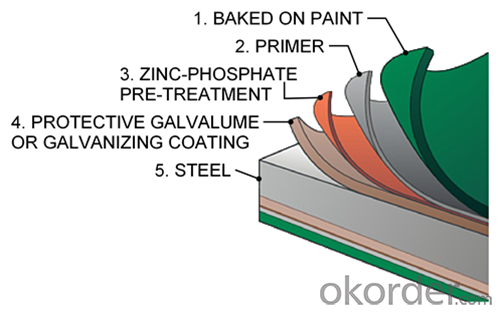
Description of Prepainted Rolled steel Coil for Construction Roofing
Prepainted Rolled steel Coil is a kind of coated steel coil/sheet. With the cold rolled steel of different strength and thickness as substrate, it is produced through applying Al-Zn coat on both faces by hot dip process. In its coating, Al accounts for about 55%, Si 1.6%, while the remaining is Zn. Aluminum zinc coils enjoys both the physical protective feature and durability of Al and the electrochemical protective property of Zn. And its surface has bright silver color and regular embossed-like figure, which are highly decorative.
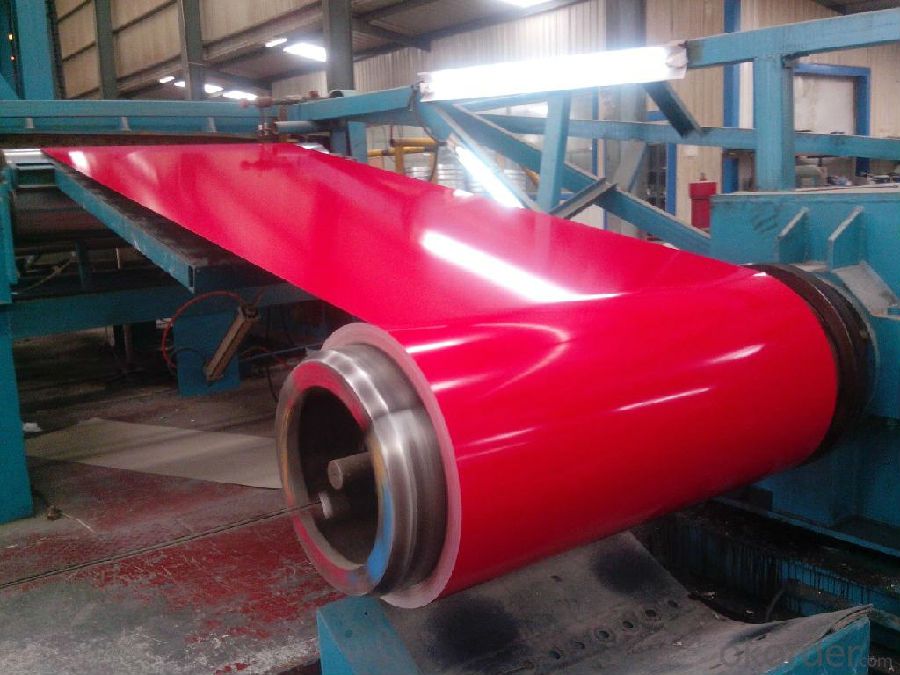
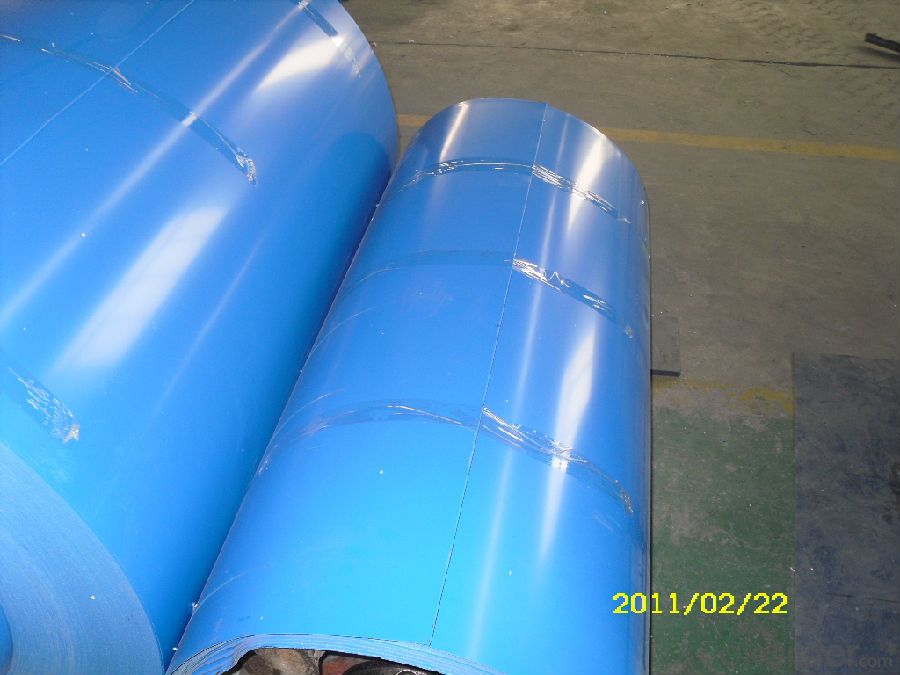
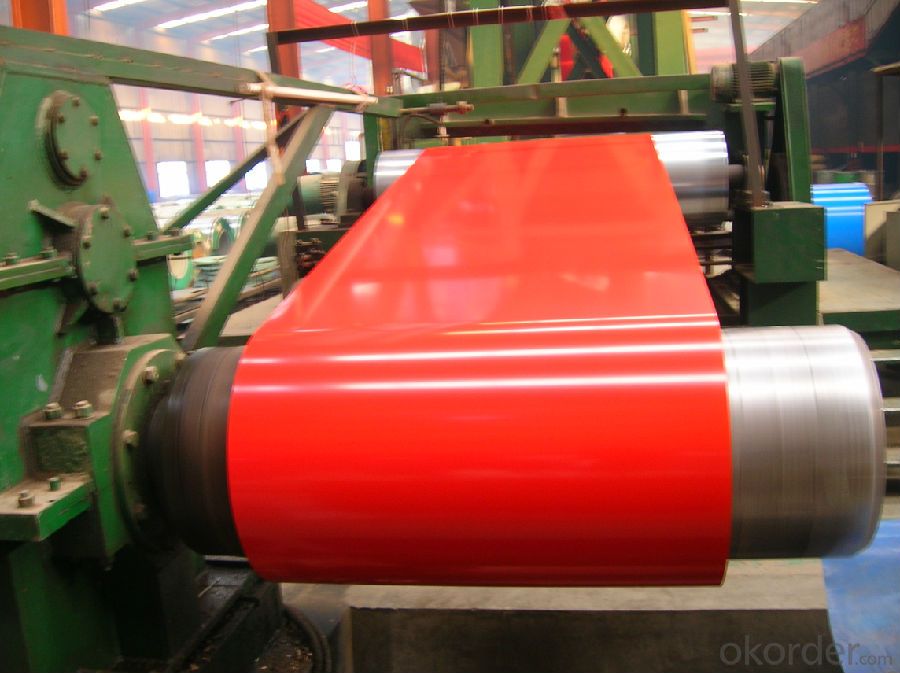
Main Feature of Prepainted Rolled steel Coil for Construction Roofing
1.Corrosion resistance: It mainly depends on the aluminum protection. When the zinc being worn, the aluminum will form a dense layer of aluminum oxide, resist corrosion material to prevent further corrosion inside.
2. Heat resistance: Aluminum zinc alloy steel sheet has excellent heat resistance, can withstand high temperatures over 300 centigrade, and is similar with aluminized steel high temperature oxidation resistance. It often used in chimney pipes, ovens, fluorescent lighting device and the device cover.
3. Heat reflective: Galvanized steel plate heat-reflective high rate is twice as galvanized steel, often used to make insulation materials.
4. Economy: Because density of 55% AL-Zn is smaller than the density of Zn, so in the same weight and thickness of Galvanized zinc layer, aluminum-zinc steel plate is larger area more than 3% of galvanized steel sheet.
Applications of Prepainted Rolled steel Coil for Construction Roofing
1. Construction and building: roofing; ventilating duct; handrail; partition panel;etc.
2. Electric appliance: refrigerator; washing machine; refrigerator; DVD;etc.
3.Transportation: oil tank; road sign; etc.
4.Agriculture:barn; etc.
5.Others:vending machine; game machine; etc.
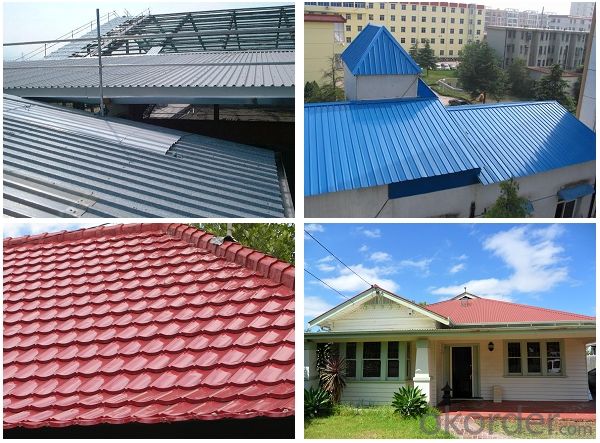
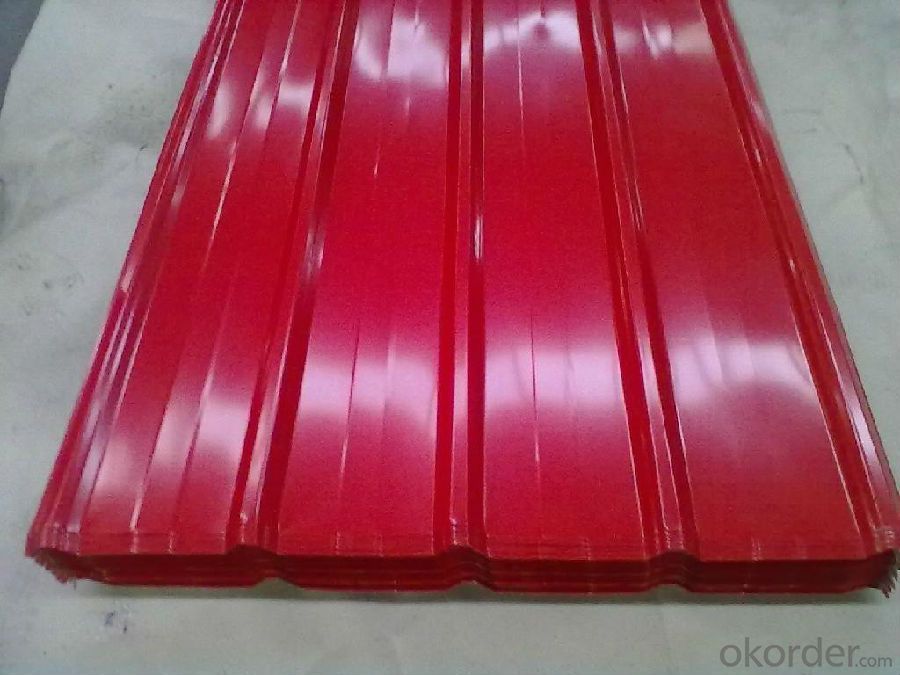
Specifications of Rolled steel Coil for Construction Roofing
Product | Prepainted Rolled steel Coil for Construction Roofing |
Material Grade | SGCC / SGCH / DX51D+AZ, etc |
Thickness | 0.2-3.0mm |
Width | 600-1500mm |
Tolerance | Thickness: +/-0.02mm , Width:+/-2mm |
Zinc-coating | AZ40-150g/m2 |
Technique | Raw material: Hot rolled steel coil --> Cold rolled_>hot dipped galvalume |
Surface | Dried, Chromated, Unoiled |
Spangle | Regular spangle , small spangle, zero spangle |
ID | 508MM |
Coil weight | 10MT max |
Export package | Cardboard inner sleeves, Waterproof paper, galvanized steel covered and steel strip packed |
FAQ of Prepainted Rolled steel Coil for Construction Roofing
We have organized several common questions for our clients,may help you sincerely:
1. What is the minimum order quantity ?
Our MOQ is 50mt for each size. And we will consider to give more discount if you make big order like 1000 tons and more. Further more, the more appropriate payment term your offer the better price we can provide.
2. How long can we receive the product after purchase?
Usually within thirty working days after receiving buyer’s advance payment or LC. We will arrange the factory manufacturing as soon as possible. The cargo readiness usually takes 15-25 days, but the shipment will depend on the vessel situation.
3. How to guarantee the quality of the products?
We have established the international advanced quality management system,every link from raw material to final product we have strict quality test;We resolutely put an end to unqualified products flowing into the market. At the same time, we will provide necessary follow-up service assurance.
- Q: How do you calculate the weight of a steel coil?
- To calculate the weight of a steel coil, you need to know the dimensions of the coil, specifically its length, width, and thickness. Then, you can use the density of steel (usually around 7850 kg/m³) and the formula: weight = length x width x thickness x density.
- Q: I've seen on TV that stainless steel laminate sheets can be purchased and and used to cover appliances to give it a faux stainless steel look. They mentioned it was important to not have any bubbles (of course) and to work slowly. It's easy to do on a dishwasher, but what about the fridge? The handles are in the way? Do you have to take the handles off? Can anyone find a tutorial for me?
- There okorder appliance paint 2. What you are referring to really is not laminate steel sheets, it's actually more along the lines of shelf liner paper looks like steel with sticky back film that you peel and stick. Place against product and begin to peel down slowly using squeegee or credit card to smooth out bubbles.Sheets can be purchased rangingin size on OKorder for $9.99 + dependent on size. Called stainless steel appliance film can buy a roll for $60.00 on OKorder (normally sells for $100.00) one roll will cover 3 average sized kitchen appliances. Hope this helps!
- Q: how is stainless steel made? what are the things used in making it?
- There are different recipes, and different types of steel are made for different purposes. They all share high temperatures, which allows extra carbon to bind with the iron. This is the main thing that makes steel stainless, or rustproof. Other metals such as chromium, molybdenum, magnesium etc. are often added to increase tensile (twisting) strength, flexibility, etc.
- Q: Steel is a mixture of Iron Carbon . So , is steel a metal or non - metal ?
- Steel is an alloy mostly made of metallic elements. You really wouldn't classify steel as a metal or a nonmetal. That terminology is mostly used with pure elements.
- Q: How are steel coils used in the manufacturing of industrial equipment?
- Steel coils are commonly used in the manufacturing of industrial equipment due to their versatility and strength. These coils are typically made from high-quality steel and are shaped into a coil form to facilitate easy transportation and storage. One of the primary uses of steel coils in industrial equipment manufacturing is for the fabrication of structural components. These coils are often cut, shaped, and welded to create various parts and structures that provide support and stability to the equipment. For example, steel coils can be used to construct frames, beams, and brackets that form the backbone of heavy machinery. Steel coils are also used in the production of mechanical components such as gears, shafts, and bearings. These components require high strength and durability to withstand the heavy loads and harsh operating conditions encountered in industrial settings. By using steel coils, manufacturers can ensure that these parts have the necessary strength and resilience to perform reliably. Additionally, steel coils are employed in the manufacturing of equipment surfaces that require corrosion resistance or aesthetic appeal. Steel with specific coatings or finishes can be rolled into coils to create sheets or plates that are used to construct outer casings, panels, or covers for industrial equipment. These coatings not only protect the equipment from environmental factors but also enhance its appearance. Furthermore, steel coils can be transformed into pipes and tubes, which are vital components in many industrial applications. These pipes are used to transport various fluids, gases, or materials within the equipment. The strength and structural integrity of steel coils ensure that the pipes can withstand high pressure, temperature, and mechanical stress, making them suitable for demanding industrial environments. In conclusion, steel coils play a crucial role in the manufacturing of industrial equipment. They are used to fabricate structural components, mechanical parts, surface finishes, and pipes. The versatility, strength, and durability of steel coils make them a preferred choice in the industrial equipment manufacturing industry.
- Q: I beat fallout 3 and i downloaded broken steel expansion. I have no idea how to get to broken steel in other words i do not know how to start playing it.
- Broken Steel Fallout 3
- Q: I have a steel string, Yamaha acoustic guitar that I am learning to play at home. But at school I use a rented nylon string guitar. I like the feel of the nylon strings better then the steel strings and i was wondering if i can just switch strings or if i should just get another guitar. Can anyone help?
- No, a steel string guitar is built and braced for the greater tension of steel strings, which means it's too heavily built to respond properly to nylon strings. It would sound awful. Besides, the slots in the nut are too narrow on a steel-string, the action is too low, and the bridge is made for ball end strings (most high quality nylon strings are plain end). And you would have to turn the narrow string posts on steel-string tuners forever to get anywhere with stretchy nylon strings.
- Q: can u use stainless steel to make a coin? why or why not? answers based on facts plz.
- Stainless steel has been used by some countries to make coins, but it's not an ideal metal. When a coin is struck, a die comes down and strikes the blank with many tons of force (the blank is also sitting on top of another die--one has the image on the obverse (front) of the coin, while the other die has the image of the reverse of the coin). When the die strikes the blank, the force causes the metal in the blank to flow into the recesses of the die. The problem with stainless steel is that it doesn't want to flow into the die. To get an image, either the relief (how high the raised portion of the design will be) has to be very low, and the coin has to have a simple design, or they have to greatly increase the pressure of the strike. This slows the coining press down, and greatly shortens the life of the dies.
- Q: What are the weight ranges for steel coils?
- The weight ranges for steel coils can vary depending on the specific type and size, but they typically range from a few hundred kilograms to several metric tons.
- Q: exactly what is the differance between strontuim steel and stainless steel any differances as far as hardness .... need help.
- Strontium steel is created by soaking a mild steel in strontium chromate, which has a pH of about 4 or 5, roughly the equivalent of acid rain. Chromate affects the cathodic reaction, with reduction of Cr6+ to Cr3+, and the surface film was composed of magnetite and hydrated chromium hydroxide. The Strontium is a radioactive isotope. The acid bath permeates the mild steel causing it to become mildly radioactive. Simular to oil imprengation of brass and other metals. Strontium Steel has a very high value of inhibition. However due to it's radioactive properties it is not a commonly used or manufactured material. As for where to actually obtain Strontium steel dowels. I have no idea i would speculate that you would have to purchase the raw stock and have it machined into a dowel for you.
Send your message to us
Prepainted Rolled steel Coil for Construction Roofing constrution
- Loading Port:
- Shanghai
- Payment Terms:
- TT OR LC
- Min Order Qty:
- 50 m.t.
- Supply Capability:
- 30000 m.t./month
OKorder Service Pledge
OKorder Financial Service
Similar products
Hot products
Hot Searches
Related keywords
